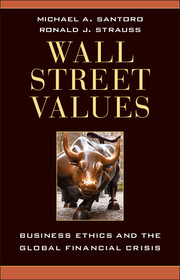Book contents
- Frontmatter
- Contents
- Preface
- Acknowledgments
- Part One Background and Theoretical Framework
- Part Two Wall Street Business Model, Regulation, and Values in Transition
- Chapter Three The Gathering Storm
- Chapter Four From Financial Services to Proprietary Trading
- Chapter Five Secrets and Lies
- Part Three Policy Recommendations and Sustainable Values for Wall Street in the Twenty-First Century
- Notes
- Index
Chapter Four - From Financial Services to Proprietary Trading
The Transformation of Wall Street’s Business Model
from Part Two - Wall Street Business Model, Regulation, and Values in Transition
Published online by Cambridge University Press: 05 February 2013
- Frontmatter
- Contents
- Preface
- Acknowledgments
- Part One Background and Theoretical Framework
- Part Two Wall Street Business Model, Regulation, and Values in Transition
- Chapter Three The Gathering Storm
- Chapter Four From Financial Services to Proprietary Trading
- Chapter Five Secrets and Lies
- Part Three Policy Recommendations and Sustainable Values for Wall Street in the Twenty-First Century
- Notes
- Index
Summary
Introduction
Beginning roughly in the last two decades of the twentieth century and culminating with the 2008 financial crisis, the dominant Wall Street business model transformed from a customer-driven focus with a minor proprietary trading component to one where principal transactions, and in particular trading in mortgage-backed securities, came to dominate the profits and attention of the brightest minds in the financial industry. This transformation represents a major shift in Wall Street’s business model. The bulk of Wall Street’s profits today are no longer derived from providing financial services to clients. Instead, Wall Street firms generate profits mostly from investing their own capital. The rise of principal transactions occurred not coincidentally just as the financial industry was also experiencing enormous growth in scale as, in the two decades preceding the financial crisis, every major Wall Street firm went from being a privately funded partnership to a publicly held company.
In Chapter two we introduced the idea that profit disjunction occurs when the profits of Wall Street are not aligned with the prosperity of the economy as a whole. In this chapter, we examine how Wall Street profits became unhinged from and dangerous to the general welfare of society. We describe not only how Wall Street became dependent on proprietary trading and the perverse compensation incentives encouraging moral hazard and excessive risk taking, but also how Wall Street became so large that its potential failure as a business sector threatened the stability of the global economy. Our purpose in doing so is not simply to address the issue of “too big to fail” and the bailout. Our objective is to demonstrate how the shift in Wall Street’s business model from serving clients to proprietary trading accompanied a crisis in Wall Street values that in no small measure contributed to the financial crisis. We are concerned, in other words, not only with the threats Wall Street poses to the general economy when it fails, but also with the dangers it creates when it is successful following the postmillennial proprietary trading business model. We begin our analysis, however, by recalling a long bygone era when ongoing customer relations, based upon trust and mutuality, were an essential foundation for the creation and success of the financial industry.
- Type
- Chapter
- Information
- Wall Street ValuesBusiness Ethics and the Global Financial Crisis, pp. 90 - 113Publisher: Cambridge University PressPrint publication year: 2012

